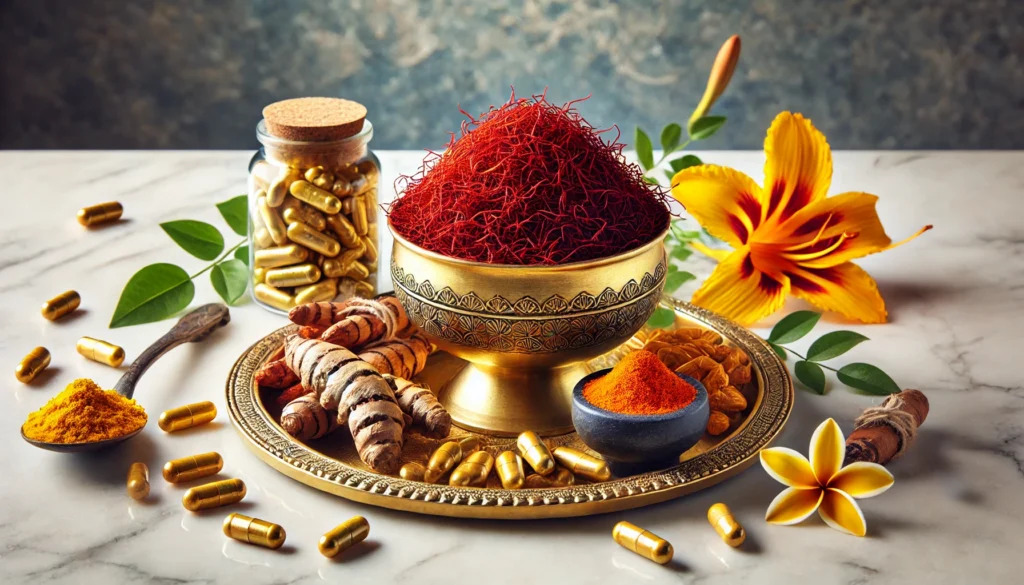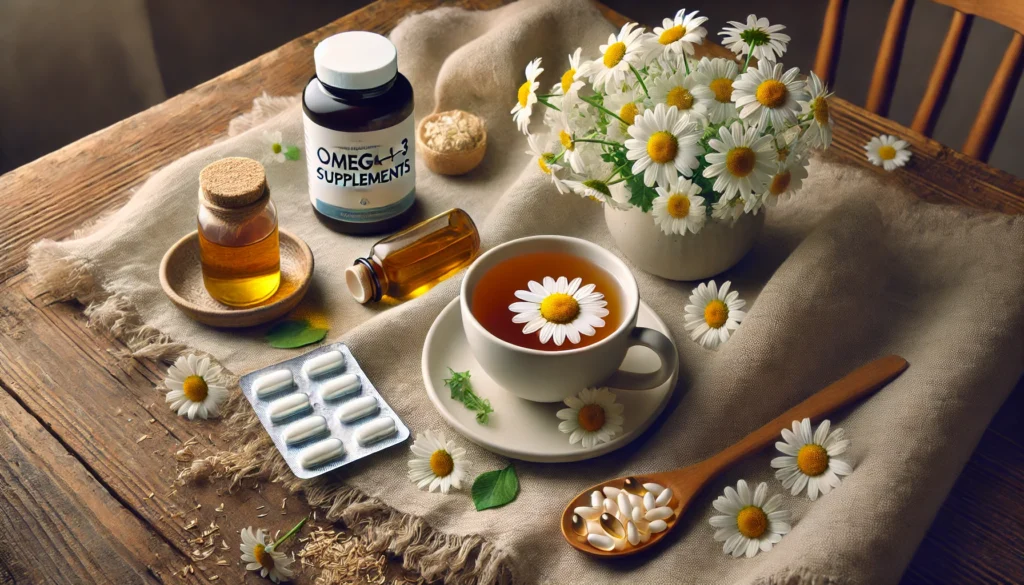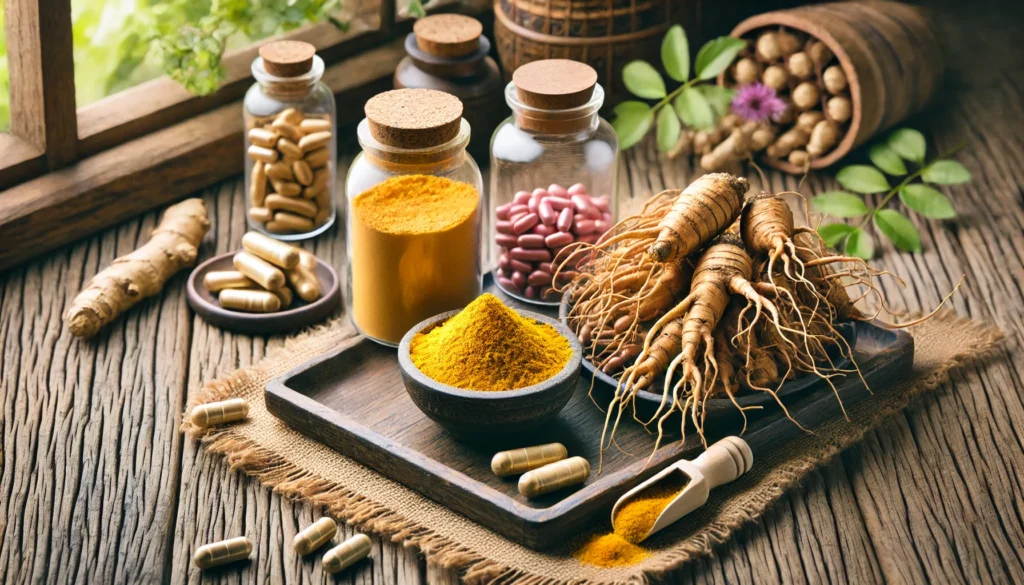Depression is a pervasive mental health issue. It affects millions of people worldwide, impacting their daily lives and overall well-being.
Traditional treatments for depression often involve medication and therapy. However, some individuals seek natural alternatives. They aim to manage their symptoms in a way that aligns with their lifestyle and personal beliefs.
Herbs have been used for centuries to treat various ailments. This includes mood disorders such as depression. Today, we see a resurgence in the interest in these natural remedies.
Scientific research is beginning to explore the potential of various herbs in alleviating depression symptoms. Some of these herbs have shown promising results. Yet, it’s important to approach this topic with a balanced view.
This article aims to provide a comprehensive overview of natural herbs for depression. We’ll delve into the science behind their potential benefits. We’ll also discuss how to safely incorporate them into your daily routine.
Whether you’re a health and wellness coach, a science journalist, or a biohacker, this article is for you. It’s designed to be a reliable source of information on this important topic.
Let’s embark on this journey to explore the potential of nature in supporting mental health.
You may also like: Top Supplements to Alleviate Anxiety Naturally
Understanding Depression
Depression is more than just feeling sad. It’s a complex mental health disorder that affects how you feel, think, and handle daily activities. Millions of people around the globe experience its debilitating effects.
Symptoms of depression can vary significantly from person to person. Some common symptoms include persistent sadness, loss of interest in activities, changes in appetite, and difficulty sleeping. Severe cases may lead to thoughts of self-harm.
The causes of depression are not fully understood. It’s believed to result from a combination of genetic, biological, environmental, and psychological factors. Stressful life events, such as the loss of a loved one or trauma, can trigger depression in susceptible individuals.
Conventional treatments involve a combination of medication and psychotherapy. While effective for many, these approaches don’t work for everyone. Some individuals experience side effects or don’t see significant improvements, leading them to explore natural methods.
There are several natural ways to handle depression. These methods focus on lifestyle changes and holistic healing practices. Common natural methods include regular exercise, maintaining a balanced diet, practicing mindfulness, and exploring herbal remedies. It’s essential to approach these methods with guidance from a healthcare professional to ensure safety and efficacy.

The Role of Herbs in Mental Health
Herbs have been used for centuries in traditional medicine systems across the globe. Cultures like Ayurveda and Traditional Chinese Medicine highlight their significance in promoting mental well-being. These systems have long recognized the potential of herbs in treating mood disorders, including depression.
Modern science is beginning to validate these ancient practices through research. Studies suggest that certain herbs may have properties that alleviate depression and anxiety symptoms. These natural remedies offer an alternative to conventional medications, which can have unwanted side effects.
One of the primary benefits of using herbs is their potential to address more than just the symptoms of depression. Many herbs possess adaptogenic properties, helping the body resist various stressors. By reducing stress, herbs can improve overall mental resilience and emotional health.
Some herbs work by targeting neurotransmitter systems in the brain. These herbs can influence serotonin, dopamine, and other critical neurotransmitters involved in mood regulation. They may help stabilize mood, enhance mental clarity, and boost energy levels, providing a natural way to battle moodiness and depression.
It’s essential to note that while herbs can offer significant benefits, they are not a cure-all. The effectiveness can vary based on individual differences and conditions. Consulting with healthcare professionals is key to integrating these herbal remedies safely into a broader treatment plan.
St. John’s Wort: A Prominent Herb for Depression
St. John’s Wort is one of the most researched herbal remedies for depression. Known scientifically as Hypericum perforatum, it has gained popularity for its potential antidepressant effects. Many cultures have used this herb historically to uplift mood and combat sadness.
Clinical studies indicate that St. John’s Wort may be as effective as some antidepressants for mild to moderate depression. The herb is believed to work by increasing serotonin levels, much like conventional antidepressant drugs. This makes it a natural option for those seeking non-pharmaceutical avenues to manage depression.
However, while St. John’s Wort offers promise, it is not without its cautions. It can interact with several medications, reducing their efficacy or causing adverse effects. Therefore, consulting with a healthcare provider before starting St. John’s Wort is critical. This ensures that it’s an appropriate and safe choice for your specific health needs and conditions.
Saffron: The Mood-Enhancing Spice
Saffron, a vibrant, golden spice, is more than a culinary delight. It holds potential as a natural remedy for depression. Clinical trials have shown saffron’s effectiveness in improving depressive symptoms, placing it in the spotlight as a viable herbal option.
The spice works by enhancing neurotransmitter levels, such as serotonin, which play vital roles in mood regulation. This bioactive property of saffron makes it beneficial for those seeking natural ways to combat depression. Its mood-enhancing effects are largely attributed to two compounds: crocin and safranal.
Despite its benefits, saffron should be used with care. High doses may lead to side effects, such as dizziness or dry mouth. It’s essential to adhere to recommended dosages and consult a healthcare provider, particularly if combining saffron with other treatments. As always, a tailored approach ensures the safe and effective use of this potent spice.
Lavender: Calming the Mind
Lavender is famous for its serene and calming properties. This fragrant herb has been used for centuries to ease anxiety and stress. Its calming effects make it a popular choice in natural remedies for anxiety and depression.
The soothing effects of lavender come from its essential oils. These oils can reduce stress and promote relaxation, offering relief from depression symptoms. Studies suggest that inhaling lavender oil reduces anxiety levels, providing comfort during tough times.
Incorporating lavender into daily routines is easy and beneficial. It can be used in aromatherapy, added to baths, or consumed as tea. However, consistency is key to reaping its benefits. As with any herbal remedy, it is wise to consult with a healthcare professional, ensuring its safe use alongside other treatments.
Chamomile: A Gentle Soother
Chamomile is cherished for its soothing and gentle properties. This herb is commonly consumed as a tea, providing relaxation and stress relief. Its calming effects can be helpful for those experiencing anxiety and mood disturbances.
Historically, chamomile has been used to promote sleep and ease nervous tension. It contains compounds like apigenin that bind to brain receptors, reducing feelings of agitation. Some studies show that it can help alleviate mild symptoms of anxiety and depression.
Incorporating chamomile into a daily routine is simple. Enjoying a warm cup of chamomile tea before bed can enhance relaxation and improve sleep quality. Additionally, its essential oils can be used in aromatherapy to create a calming atmosphere. While chamomile is generally safe, consulting with a healthcare provider ensures it’s suitable for individual needs, especially when combined with other treatments.
Ashwagandha: The Stress Resistor
Ashwagandha is renowned for its adaptogenic qualities, helping the body cope with stress. Often used in Ayurveda, this powerful herb supports mental well-being by modulating the body’s stress response. Its active compounds, called withanolides, are thought to have anti-inflammatory and anxiolytic effects.
Research has shown that ashwagandha can lower cortisol levels. Cortisol is a hormone linked to stress, anxiety, and even depression symptoms. By managing this hormone, ashwagandha may aid in reducing stress and promoting a more balanced mood.
Including ashwagandha in your wellness routine is straightforward. This versatile herb is available in various forms, such as capsules, powders, and tinctures. It’s crucial to choose a reputable source to ensure quality and potency. Before beginning an ashwagandha regimen, consulting with a healthcare professional is recommended, especially for those with health conditions or who are pregnant.
Rhodiola Rosea: Fighting Fatigue and Depression
Rhodiola Rosea is a revered herb known for its capacity to combat fatigue and boost mood. Originating from cold, arctic regions, it’s prized for its adaptogenic properties. It helps the body manage stress by optimizing energy levels and enhancing resilience.
Research suggests that Rhodiola can improve symptoms of depression and reduce stress-induced fatigue. Its active constituents, rosavins and salidroside, are believed to influence serotonin and dopamine levels. These neurotransmitters play a significant role in regulating mood and energy.
Incorporating Rhodiola into your daily routine can be easy with options like capsules or tea. It is advisable to start with a lower dose and gradually increase it. As always, consultation with a healthcare provider is recommended to tailor your usage and to check for possible interactions with other medications. Rhodiola stands out as a natural ally in the battle against tiredness and low mood.
Omega-3 Fatty Acids: Brain Health and Mood
Omega-3 fatty acids are vital nutrients that profoundly impact brain health and emotional well-being. Found abundantly in fatty fish like salmon and mackerel, they are integral to brain function. These essential fats have been shown to improve mood and reduce depression symptoms.
Clinical studies highlight their antidepressant potential, particularly eicosapentaenoic acid (EPA) and docosahexaenoic acid (DHA). These components may help regulate neurotransmitters, which are chemicals that influence mood. Omega-3s have also been linked to reduced inflammation, a factor in depression.
Including omega-3-rich foods in your diet can enhance mood and support overall mental health. Supplements can be a convenient alternative, especially for those with dietary restrictions or vegetarian preferences. However, it’s important to consult with a healthcare professional before starting any new supplement regimen, ensuring that the intake is appropriate and beneficial for your specific health needs.
Curcumin: The Anti-Inflammatory Antidepressant
Curcumin, the vibrant yellow compound in turmeric, is gaining attention for its antidepressant properties. Known for its powerful anti-inflammatory effects, curcumin may help alleviate depression by reducing inflammation. Inflammation in the body has been linked to the development and progression of depression.
Research suggests curcumin can influence several neurotransmitters, including serotonin and dopamine, which play a key role in mood regulation. By balancing these chemicals, curcumin may contribute to improved mood and mental clarity. Its antioxidant properties further support brain health, potentially mitigating oxidative stress associated with depression.
Incorporating curcumin into your routine could be as simple as adding turmeric to meals or taking it as a supplement. However, bioavailability can be a concern with curcumin, meaning the body doesn’t easily absorb it. Combining it with black pepper or fats can enhance absorption, making supplementation more effective. Always consult a healthcare provider to ensure safe and beneficial use.
Ginseng: An Energizing Option
Ginseng has been prized in traditional medicine for its invigorating effects. Known to enhance energy and reduce fatigue, it may also help alleviate depression symptoms. Its adaptogenic properties can aid the body in coping with stressors, potentially improving mental well-being.
Studies indicate ginseng may influence the hypothalamic-pituitary-adrenal (HPA) axis, a key stress response system. By modulating this system, ginseng may contribute to reduced stress levels and an improved mood. This can be particularly beneficial in managing depression and enhancing resilience to life’s challenges.
Incorporating ginseng into your wellness plan can involve dietary supplements or even sipping ginseng tea. As with other herbal treatments, it’s vital to consult a healthcare professional. They can provide personalized advice to ensure safe interaction with other medications or conditions. Starting with a low dosage and monitoring your body’s response can help achieve the best results.
Lemon Balm and Passionflower: Easing Anxiety and Depression
Lemon balm has a history of use as a calming herbal remedy. Traditionally, this herb is leveraged for reducing stress and promoting relaxation. Emerging research supports its potential to ease symptoms of anxiety and depression.
Passionflower is another powerful ally in the fight against anxiety. It is believed to increase gamma-aminobutyric acid (GABA) levels in the brain. GABA helps reduce brain activity, leading to a calming effect, which can be especially helpful for those dealing with anxiety and mood disorders.
Integrating these herbs into your wellness routine can be simple. They are often consumed as teas, tinctures, or supplements. However, it’s crucial to consult with a healthcare provider before starting. This ensures that passionflower and lemon balm are safe and appropriate for your specific health needs.

Safety and Considerations When Using Herbs
When considering herbs for depression, safety is paramount. Herbal remedies can interact with conventional medications. St. John’s Wort, for example, may interfere with antidepressants, birth control, and other medications.
It’s essential to consult with a healthcare provider before starting any new herbal regimen. They can help determine the appropriateness of herbs based on individual health conditions and medications. Transparency with healthcare providers ensures a safe and effective treatment plan.
Consider potential side effects. While herbs are natural, they can still cause adverse reactions. Common side effects may include digestive upset, dizziness, or allergic reactions. It’s important to start with a small dose and monitor for any unusual symptoms.
Here are some key points to remember when using herbs:
- Always discuss with a healthcare provider first.
- Be aware of potential herb-drug interactions.
- Monitor for side effects.
- Source herbs from reputable suppliers.
- Consider quality and potency.
By taking these precautions, individuals can effectively incorporate herbs into their mental health regimen while minimizing risks. This thoughtful approach supports a safe and beneficial use of herbal treatments.
Integrating Herbs into Your Lifestyle
Incorporating herbs into daily life can offer a natural way to manage depression. The flexibility in herbal usage is ideal for diverse lifestyles and preferences. A personalized approach ensures effectiveness and enjoyment.
Herbs can be consumed in various forms, such as teas, capsules, or tinctures. Teas and infusions provide a soothing ritual. Capsules offer convenience and precise dosing for those with busy schedules.
Consider combining herbs with existing routines to enhance consistency. Morning supplements or evening teas can seamlessly blend into daily activities. This integration helps maintain regularity, essential for seeing results.
Below are some practical tips for integrating herbs:
- Start slow, with one herb at a time.
- Keep a journal to track effects and adjustments.
- Pair with other wellness practices, like yoga or meditation.
- Experiment with herbal recipes, such as soups or smoothies.
Integration requires patience and consistency. It may take several weeks to notice significant improvements in mood and energy levels. By gradually weaving herbs into daily life, individuals can naturally enhance their mental well-being. This holistic approach encourages sustainable lifestyle changes that complement herbal benefits.

Conclusion: A Holistic Approach to Depression
Addressing depression requires a comprehensive, balanced strategy. Herbs offer a natural adjunct to conventional treatments. They can mitigate symptoms while promoting mental clarity and emotional resilience.
Understanding the roots of depression is essential. Combine herbal remedies with lifestyle adjustments to target both symptoms and underlying causes. Nutrition, exercise, and mindfulness practices play significant roles alongside herbs.
Every individual’s journey to mental wellness is unique. It is crucial to tailor a holistic plan that encompasses mind, body, and spirit. Collaboration with healthcare professionals ensures safe and effective use of herbs. By integrating these natural aids into a broader self-care routine, individuals can empower themselves towards sustained mental health and well-being.
Further Reading:
Mayo Clinic : Natural remedies for depression: Are they effective?
WebMD: Alternative Treatments for Depression
Healthline: 11 Herbs and Supplements to Help Reduce Symptoms of Depression
Important Note: The information contained in this article is for general informational purposes only, and should not be construed as health or medical advice, nor is it intended to diagnose, prevent, treat, or cure any disease or health condition. Before embarking on any diet, fitness regimen, or program of nutritional supplementation, it is advisable to consult your healthcare professional in order to determine its safety and probable efficacy in terms of your individual state of health.
Regarding Nutritional Supplements Or Other Non-Prescription Health Products: If any nutritional supplements or other non-prescription health products are mentioned in the foregoing article, any claims or statements made about them have not been evaluated by the U.S. Food and Drug Administration, and such nutritional supplements or other health products are not intended to diagnose, treat, cure, or prevent any disease.


